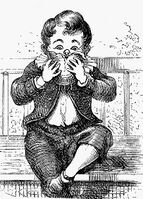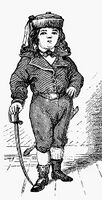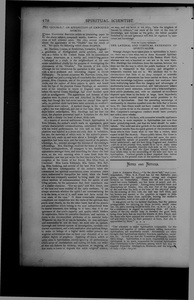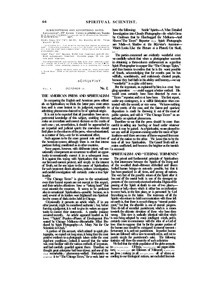<Untitled> (There is great activity in the small)
...
The "Double" or Apparition of Embodied Spirits
Emma Hardinge Britten writes an interesting paper on the above subject, composed mostly, however, of narratives of well attested cases. She cites several instances where the appearance of the “Double” was the result of will. We quote the following which closes the article.
Mr. Harrison Greene, of Brotherton, Yorkshire, England— a gentleman of distinguished social position, and one who as a visitor to the United States will be remembered by many Americans as a worthy and truth-loving person —belonged to a circle in the neighborhood of his own estate established chiefly for the purpose of investigating the phenomena of the “Double.” The records of this circle, although far too voluminous for quotation in this paper, furnish a most profound and interesting chapter in Occult Philosophy. On several occasions Mr. Harrison Green, himself a good seen and a young lady of remarkably fine clairvoyant powers, Miss Chapman, one of the principal mediums of the circle, saw the author of these papers in spirit, and heard from the lips of the phantom Emma Hardinge, an announcement of her intention to return to England some weeks before the mortal Emma Hardinge had even decided upon such an arrangement. The appearance and dresses of this phantom were so clearly seen and described by Miss Chapman, that though she had never seen her except thus spiritually, no portrait could have been more accurate, no modiste's description more correct. A marked change in the style of coiffure too was observed, and just at that time, when a few days before embarkation, Mrs. Hardinge had her hair cut short, the phantom presented itself in Yorkshire for the first time, with a closely cut head of short, thick curls.
At a seance of several well-known French Spiritualists in New Orleans, the author’s wraith made an appearance, gave certain characteristic communications, entertained the circle with her weird performances for over half an hour. This phantom was habited in a dress not even then in existence, but one, the materials of which were in the author’s possession, but only made up and wore about a fortnight after its apparition had been seen, and the exact record of its pattern, trimmings, &c., entered amongst the minutes of the evening’s proceedings. Mrs. Hardinge received the letter of her New Orleans correspondents, all strangers to her, detailing her appearance amongst them, and describing the dress she had worn, on the very morning when it came fresh from the dressmaker, and was put on for the first time for a New Year’s reception at the house of her friend, Mrs. Eliza Neal, at Cincinnati. Miss Laura Edmonds, Mrs. Sweet, Mrs. Kellog, Miss Seabring, and several of the best New York mediums who were cotemporaries of the author’s when she commenced her spiritual experiences, some seventeen years since, endeavored to tranquilize her mind, when she found that she was constantly annoyed by being made the unconscious medium of communications from the spirits of still living persons, by the assurances that their experience was of a similar character. “For my part,” said Mrs. Sweet, one of the best and most truthful of the early mediums, “I am always uncertain whether the spirit I am communicating for is in the form, or out of it, until some test facts reveal the true state of the case.” If these remarkable phenomena complicate our researches into the realm of the spiritual, they prove most clearly, on the other hand, that all the powers and possibilities which belong to the soul enfranchised from its mortal tenement, also belong to it here; that it is our ignorance of that soul's capacity and quality which hinders its expression, limits its executive functions, and narrows it I down to the circumscribed attributes of its material body. Whatever we may be or can do hereafter, we may anticipate and measurably be and do here; we need only an earnest, thorough and rational system of investigation, carefully conducted experiment, and a lofty aspiration after spiritual things, to make us beings of a higher mold, nobler powers, and mightier achievement than we have ever dreamed of in our wildest flights of prophecy. Spurning all mean, selfish or petty aims in Spiritualism, sternly ignoring all performances which savor of charlatanism, and casting out from our midst all that can deform by trickery, imposture or impurity, all that tends to lower or degrade this noble religious science, we may, and we must if we will, “take the kingdom of heaven by violence,” eat anew of the fruit of the tree of knowledge, and become as the gods; the fabled paradise forfeited by sin and ignorance will thus be regained by innocence and knowledge.
 |
 |
Spiritualism and "Eternal Torments"
The primal and fundamental principle of Spiritualism is, that intercourse between the Spirits of the living and of the so-called dead—between embodied and disembodied human beings—is not-only possible, but that it has been practiced in all times, and among all nations. The very fact of the possibly return of the Spirit after it has cast off the mortal body is one of the strongest opponents of the commonly-received orthodox dogma of the passing of the Spirit at death to one of two places,— heaven or hell,—from which it either has no inclination to come back, in the first place, or is prevented by God from doing so, in the latter. The testimony of all the Spirits who return to hold communication with those left on earth is, that there is no such thing as “eternal punishment,” but that the after-life is one of eternal progress. They do tell of remedial punishment, which is a means towards the ultimate elevation of those who have done wrong. This view is radically identical with that which is now being adopted by many intelligent minds, and is certainly more in consonance with the idea of a God of love than to suppose that by far the greater portion of the human race should be consigned to eternal torment: for torment it is, and not punishment. Imperfect human laws are followed with a view to remedy crime, and not to punish simply for punishment's sake. The following statistics will show the enormity of such a doctrine.
We find that the whole population of the globe amounts to 1,274,000,000. Of these, 793,000,000 are pagan idolaters; 110,000,000 are followers of Mahomet; 8,000,000 are Jews; making in all 921,000,000; all of whom, according to our theological notions, are excluded from sal <... continues on page 5-61 >
Editor's notes
- ↑ There is great activity in the small by unknown author
- ↑ The "Double" or Apparition of Embodied Spirits by unknown author, Spiritual Scientist, v. 3, No. 15, December 16, 1875, p. 178
- ↑ image by unknown author. A boy is eating
- ↑ image by unknown author. A boy with saber
- ↑ Spiritualism and "Eternal Torments" by unknown author, Spiritual Scientist, v. 1, No. 6, October 15, 1874, pp. 66-7
Sources
-
Spiritual Scientist, v. 3, No. 15, December 16, 1875, p. 178
-
Spiritual Scientist, v. 1, No. 6, October 15, 1874, pp. 66-7



